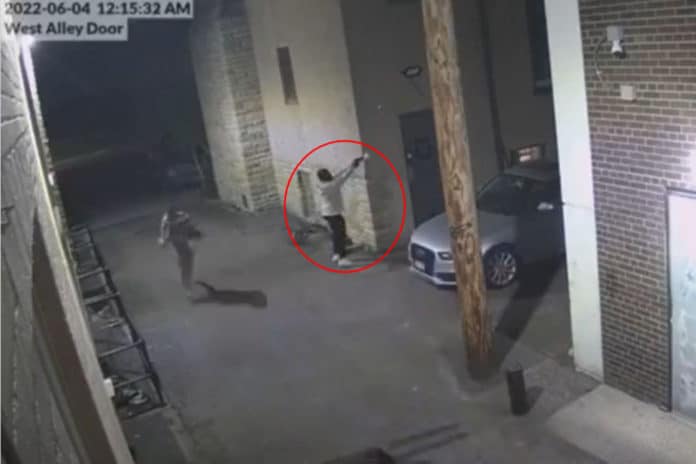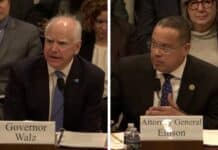
Is the University of Minnesota becoming a crime scene?
On July 7, a goalie for the Gophers women’s hockey team narrowly missed being shot. Makayla Pahl was lying in bed when gunshots breached her apartment at 1 a.m., coming within five feet of her.
The same night, a Dinkytown restaurant frequented by students was pummeled by gunfire, forcing it to close temporarily.
In early June, a shootout occurred near a fraternity house, injuring a 15-year-old male.
Sadly, these aren’t rare occurrences. As I noted in my column over the weekend, crime at the university is up 45 percent since 2019.
It’s a multi-layered problem that impacts tens of thousands of students, faculty, staff, businesses, and nearby residents. Crime occurs on both official university property and the surrounding area that is thought of — and promoted as — part of the university, though it is not.
Until recently, it’s been an issue without an audience, though not for lack of effort.
In 2019, Morgan McElroy was a student at the university when he began to sound the alarm about crime on and around campus. He sent detailed letters to stakeholders outlining issues and proposals for effecting change, attaching pages of signatures of others who shared his concerns.
Though he garnered little response, he persisted.
Crickets.
Today, as an alumnus, McElroy is one of a growing chorus of voices trying to break through the territorial gridlock between the university and the City of Minneapolis.
With depleted staff and resources and conflicting views about law enforcement, the university and the city have been playing hot potato, as neither seems to want to own the problem.
So, parents, students, and alumni are filling the void.
At a time when they should be giving their kids wings and letting them figure out life, some parents are deeply engaged in what they perceive to be a life-or-death issue. A private Facebook group has reached nearly 2,000 members who are rallying around the principle that “college should not be a crime scene.”
Brian Peck recently established a nonprofit, Campus Safety Coalition, to address safety issues at colleges throughout the U.S., with the immediate objective to make his alma mater safe again.
Peck was motivated to act after his son sent a recording of the June shootout, which took place next to his fraternity. As both a dad and an alumnus, Peck was compelled to do whatever he could to make the campus safer for both his sons.
As with so many issues today, some find the dramatic uptick in crime deeply worrisome, while others accept it as a risk of life in 2022.
“We know the anxiety it’s creating for students,” Peck says. “They already have the normal anxiety that comes with being a college student. Now, they must worry about whether they will be mugged, beat up or shot, and whether it’s safe for them to walk two blocks.“
But that’s not the only point of view. “We’re getting feedback that we’re a bunch of hysterical parents,” Peck says. “I don’t know who these people are.”
Perhaps it’s people who grew accustomed to violence in an era marked by mass shootings and violent video games.
“I talked with a parent who has two sons at the U. One of them had a gun pointed at his head,” Peck says. When his mother learned of this, she was horrified. But her son said, matter-of-factly, “Everybody knows of people who’ve had guns pointed at their heads while walking around campus.”
While there’s reason to be alarmed, there’s also reason to be cautiously optimistic.
Last Monday, the university scheduled a listening session. Though the president appeared by Zoom and only remained for 10 of the allocated 60 minutes, the university subsequently announced the formation of a Strategic Safety Advisory Committee comprised of students, parents, staff, faculty, and representatives from the city and university police departments.
Peck will be participating. As he awaits notification of the first meeting, he’s both optimistic and skeptical.
He’s looking for an all-hands-on-deck response that begins by admitting a problem exists, followed by a commitment to take meaningful action.
“Parents and students have been complaining and pleading for help and nothing has happened. So, I am going to be a very loud voice on that committee and I’m going to demand action,” he says.
Peck envisions short-term, intermediate, and long-term steps, beginning with proactive measures to deter crime.
Adding better lighting and cameras is reactive. Installing concrete barriers to make it more difficult for criminals to use their vehicles to get in and out of a crime scene, particularly in Dinkytown, is proactive, he says.
Time is not on the administration’s side. In less than two months, new and returning students, faculty, and staff will be on campus. One can only hope they move expeditiously, particularly since big donors and sponsors are paying attention now.
Peck is watching the clock. “Every single day that goes by and we haven’t put things in place, it’s another day that crimes are committed, and God forbid, somebody’s going to get killed.”
Let’s hope not.
This is the second in a two-part series. Read the first part here.









